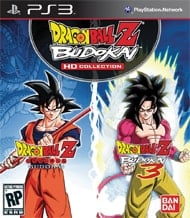Remember When DBZ Games Were Fighters?
There are a million and one Dragon Ball Z games out there. In fact, the franchise was already cranking out titles way back in the days of the NES. For some reason, we simply never chose to stop making them. Maybe this is a testament to the popularity of the show, or maybe it’s simply a way to appeal to die-hard fans who still like watching muscular men fire lasers at each other. Either way, we continue to make games about the eternal story of Goku as he fights to save the universe from aliens, mutants, bubblegum people, and other baddies.
However, Dragon Ball Z Budokai HD Collection is an oddity in the Dragon Ball Z franchise. DBZ games have usually been one step shy of shovelware, never sporting the balance of a serious fighting game, but popular enough to get the entire DBZ fan base to rush out and buy them on day one. In the beginning, DBZ games were mostly fighters, but as time went on, the DBZ franchise became less and less like a traditional fighter and more like the weird cinematic over-the-shoulder action hybrid it is today. DBZ Budokai HD collection brings DBZ fans back to when DBZ games were at least somewhat trying to pass themselves off as tournament fighters, and that is what makes the game so appealing.
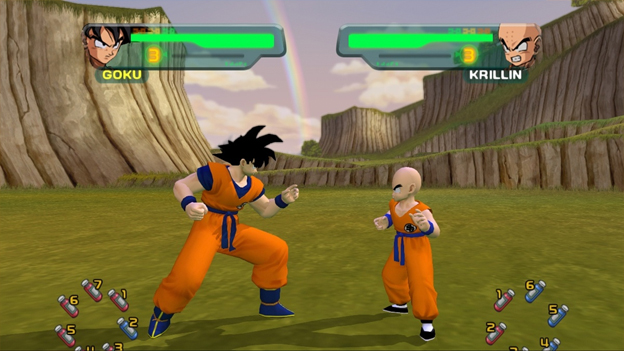
Dragon Ball Z Budokai HD Collection offers HD remakes of Budokai 1 and Budokai 3 (note that these are very different games from Budokai Tenkaichi 1 and 3). The omission of 2 is a bit strange, to say the least. Granted, Budokai 1 and Budokai 3 were received far better than Budokai 2 was, which is the official reason for leaving it out of the HD collection. Still, it leaves an unsightly gap in the series that could potentially be awkward for the collectors that the game would appeal most to.
The games play identically to how they did back in the days of the PS2. There aren’t any balance changes, mechanical updates, secret characters, or any other “remix” features that a lot of HD collections sport. Both games have been ported over faithfully, without a single change among them. Granted, the game has fully integrated trophy and achievement support, which is always a plus for the completionists out there. Otherwise, it’s simply as if you took the classic Budokai games and popped them back into your PS2, and somehow they came out looking far better than they should have.
DBZ Budokai was a cel-shaded fighting game series, and cel-shaded games always benefit the most from HD remakes. Their cartoony style adeptly hides the imperfections that HD remakes sometimes reveal. Budokai HD collection runs silky smooth in high definition, with vibrant colors, smoothed textures, and rounded polygons making it look not quite like a game designed for this generation of games, but close. Lip movement, or should I say lack thereof, is the biggest imperfection that DBZ HD Collection has to offer, but that’s not significant enough to affect your enjoyment of the game.
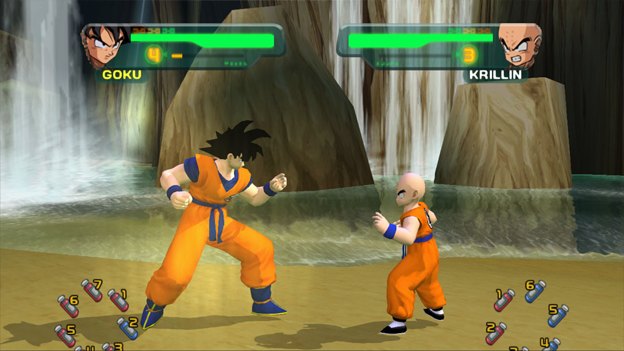
Voice acting and general audio, on the other hand, haven’t aged as well. The performances of the American voice actors are somewhat lackluster, especially in Budokai 1. Budokai 1 also doesn’t include a Japanese voice track, so you are stuck listening to early-PS2-era anime voice acting if you want to play it. Budokai 3 does have a Japanese voice track, and its English voice acting is a cut above Budokai 1’s, but it’s still not phenomenal. It’s nowhere near the quality of Dragon Ball Z Kai, the most recent reproduction of the anime series. In my opinion, the Japanese voiceovers for DBZ are actually slightly more annoying than the English voices, but purists tend to disagree, so at least the option is there.
The mechanics of both Budokai 1 and Budokai 3 remain unchanged, and for those of you who have never played either, you are essentially getting a very barebones fighting game. It’s kind of like a stripped-down Virtua Fighter with buttons for punches, kicks, guards, and Ki Blasts. Combining button presses with different directional inputs produces different strings of attacks and eventually special moves like the Kamehameha and the Special Beam Cannon.
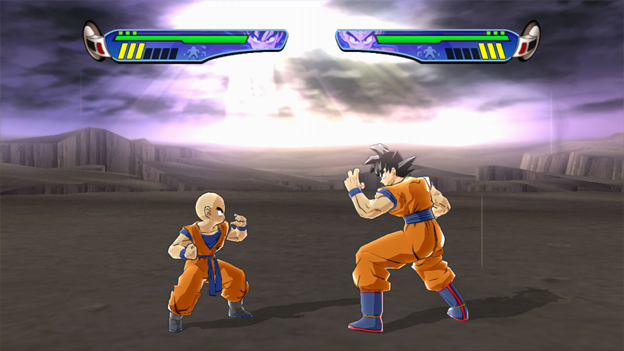
Budokai 1 doesn’t offer a whole lot of variety in terms of characters. The roster is expansive, but every character essentially has the same moves and strings. Aside from small differences in damage and, of course, special moves, every character is basically just a clone of another, and that makes versus play get boring rather quick. Budokai 3, however, has a much deeper system, allowing more defensive options, more transformations, teleports, beam struggles, and a “hyper mode” that unlocks more moves. It still features a lot of the cloned moves that Budokai 1 did, but at least there is more variety to speak of.
Both of these games also feature cinematic moments where you have to mash buttons harder that your opponent to win a beam struggle, or play minigames in order to attack with a flurry of punches. The games are fun and easy to play and the cinematic cutscenes are cool, but these in-battle quick time events break up the flow of the fight if you are used to more traditional fighters.
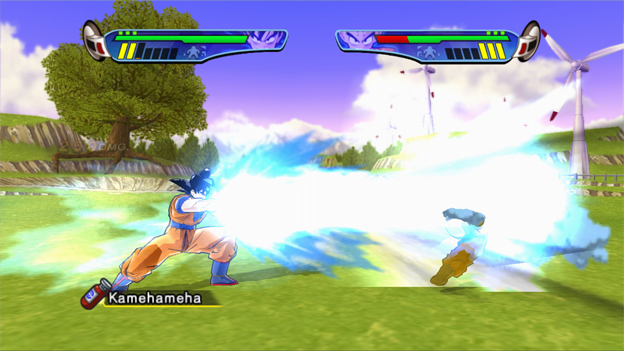
However, the real draw to both of these games isn’t the versus mode, it’s the single-player campaign. Both games retell the story of Dragon Ball Z, with Budokai 1 covering the events of DBZ up until the end of the Cell Saga, and Budokai 3 going through the movies, Buu, and even Dragon Ball GT.
Budokai 3’s single-player introduces an incredible array of RPG elements that further enhance the experience. Aside from powering up your character as you fight, you also find capsules that unlock new moves and transformations for your characters to undergo. You have multiple slots to equip these capsules to, and while powerful capsules, like fusions, take up multiple slots, you can use single slots to customize your move set and power up particular moves that you use a lot. Of course, this customization, while awesome in a single-player context, unbalances multiplayer very quick.
Dragon Ball Z Budokai HD made me realize something: All I ever really wanted was a DBZ fighting game. Sure, all the newer Dragon Ball Z releases are cool, but the simple mechanics and customization of DBZ Budokai 3 (and to a lesser extent, 1) was far more enjoyable that the cinematic systems of newer games. Hopefully, the Budokai HD collection represents a return to form for the DBZ series. A brand new DBZ game with a refined Budokai 3 system would be awesome beyond words.
RATING OUT OF 5 RATING DESCRIPTION 3.8 Graphics
Cel-shaded graphics always benefit the most from HD remakes. 3.6 Control
The controls are very basic, but they’re arguably better than many of the more recent DBZ titles. 2.0 Music / Sound FX / Voice Acting
Unfortunately, early PS2 era voice acting wasn’t all that great. 4.0 Play Value
DBZ Budokai 3 alone is worth the buy. Budokai 1 is just a nice bonus. 3.4 Overall Rating – Fair
Not an average. See Rating legend below for a final score breakdown.
| Review Rating Legend | |||
|---|---|---|---|
| 0.1 – 1.9 = Avoid | 2.5 – 2.9 = Average | 3.5 – 3.9 = Good | 4.5 – 4.9 = Must Buy |
| 2.0 – 2.4 = Poor | 3.0 – 3.4 = Fair | 4.0 – 4.4 = Great | 5.0 = The Best |
Game Features:
